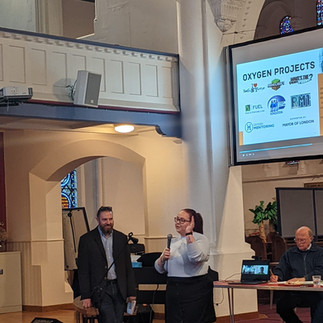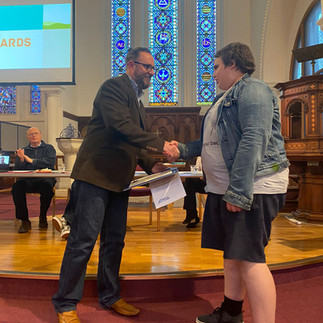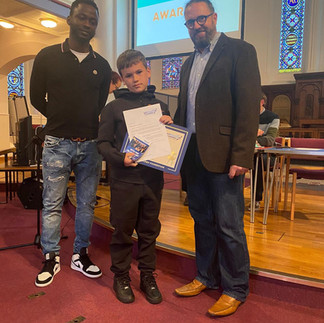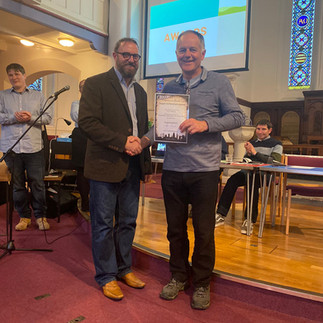- OxygenOnline2012
- Nov 12, 2022
- 5 min read
“Does anyone want a game….?”
After a little discussion, a nervous young person steps forward and picks up the bat to face me. I smile, wipe the sweat from my forehead and serve. I spent the next couple of hours in sporting combat with several young people and adults from the church and the local community. I met my match in the Church Pastor’s son-in-law, Claudio, who, it turns out, was a local table tennis champion! It was great to get to know some of the young people and talk to them about their lives and answer their questions about mine and why I had come to visit them.
One of the young people asked me how old I was. Now, my standard response this question is to ask them what they think? This normally results in me feeling quite uplifted as they try and guess my age, perhaps because they do not expect quite such an old fart like me to be engaging with them! This occasion was no different, with the young people concluding that I could be no older than 43. Get in!
The look on their faces when I told them my true age was one of astonishment and for, Claudio, disbelief! It turns out I am the same age to within a couple of days, as Pastor Gavril! I could see that Claudio was struggling to come to terms with how he had only just beaten someone so old!

As I left the church, I reflected on the conversation about my age and the son-in-laws reaction and Andrew told me that part of their disbelief might be due to the life expectancy within the Roma community which, on average, for males, is 10 years less than the equivalent Romanian population! Life expectancy in Romania is five years lower than in England! Sobering. Andrew went on to tell me that infant mortality rates are 2 to 3 times higher than the rest of Europe. Shocking!
Later that day we sat down with Pastor Gavril who wanted to know more about my work in the UK and how we engaged young people from outside the church. I talked about the youth work model which we start by meeting young people where they are at and trying to understand how the world looks from their perspective. The emphasis is on building relationship and responding to their needs, helping them and empowering them to overcome the challenges they face. By looking for opportunities to demonstrate that we care about and value young people, we are able to demonstrate Gods love and compassion for them. This can often be done in a way which sometimes seems counter cultural or unexpected.
I have long been struggling with the challenges faced by the church in how it relates to the world and society. I feel that often, our focus is on “doing church” and attracting people in to our buildings. Whilst this is a perfectly valid way of ministering to people, I am concerned that, for someone to be able to explore the Christian faith, it requires them to figure out where they need to go and to find us. When they do find us we can often seem slightly alien and despite our best attempts at being welcoming, we require them to assimilate into our culture of church, resulting in them feeling that they don’t fit in.
On a recent church weekend away I had chance to reflect on my faith and was able to get some clarity around how, as Christians, we engage with the world around us. It centred around the story about Jesus’s encounter with the Samarian woman at the well who was the first to be told that Jesus is the messiah. He said that “whoever drinks the living water that comes through me, will not thirst”. This got me thinking about the churches in our community being like the well where you can find the water of life. The challenge for the church is in getting more people to realise that they need water! But if they won’t come to the well then our role as Christians is to take the water to them at the point they need it.
As I talked about this with Andrew, who was translating into Romanian for Pastor Gavril, there was a sharp intake of breath from the Pastor followed by a fervent discussion between them in Romanian. Had I said something wrong? Had I offended my hosts or exposed my lack of understanding of the bible?
After a moment Andrew turned to me and with excitement said “it is just like the fire in the garden!” Relieved that I hadn’t put my foot in it, I asked what fire? Andrew continued to tell me how he had been watching TV the day before I arrived, and had become aware of a strange sound, like fast rushing wind or the roar of raging water! It was not coming from the T.V or anywhere in the house, so he went outside, only to discover that his neighbour’s garden was on fire and that it was spreading towards his house!
He rushed to untangle the hose and as he put out the flames nearest his house he saw his elderly neighbour standing looking in horror at the fire just a couple of meters from their own house. The lack of rain over previous weeks had left the vegetation so dry that it was spreading out of control and the neighbour seemed powerless to do anything to stop it!
Andrew quickly found a second section of hose so that it could reach his neighbours garden. He managed to prevent the fire spreading to the house and halt it long enough and allow the fire service to arrive.

In that moment Andrew became the most significant person in his neighbour’s life and his actions showed the compassion and care he had for his neighbour. Of course she was very grateful and regularly leaves some home made produce for him. It has also helped him to be accepted into the local community and enabled him to build relationships. This story also provides the perfect illustration of how we can respond to the needs of others in our community and in this case, of actually getting the water to the right place at the right time! It is about being relevant to the world we are living in. Pastor Gavril then decided that this would form the basis of the sermon for his service on Sunday morning and asked if me and Andrew would do a joint preach, which of course we did.
The idea that we are vessels that God can use to carry the water of life to those who are thirsty, at their point of need has, according to Andrew, been adopted as the strategy for growing the church in Tinca. The table tennis club is now a regular feature of the church's outreach to young people.
It was a humbling experience to visit Romania and uplifting to feel that it had been useful to the people we visited in some small way. I left with better understanding of how our most basic of skills, along with the extraordinary events provide us with opportunities to help others. Don't underestimate the impact you can have by doing something simple for someone else. I could be of great significance to them in making them feel valued and cared for.

























































































